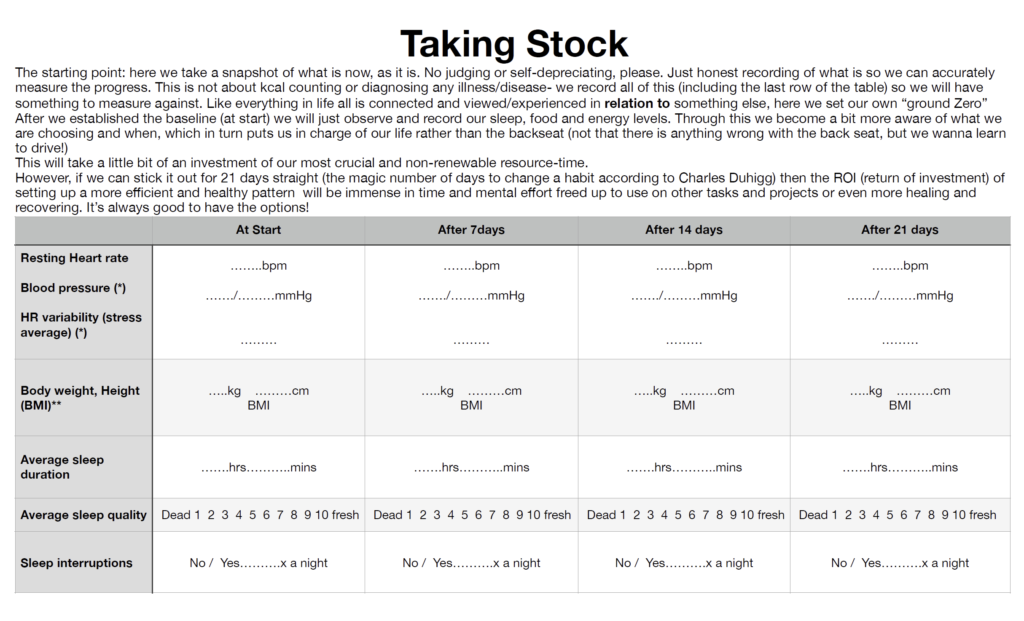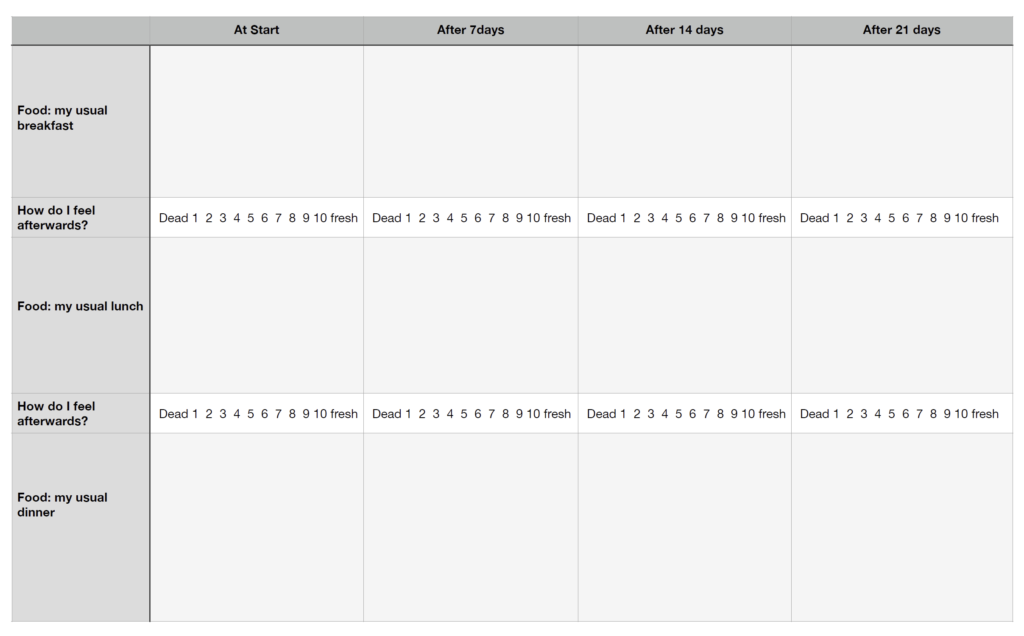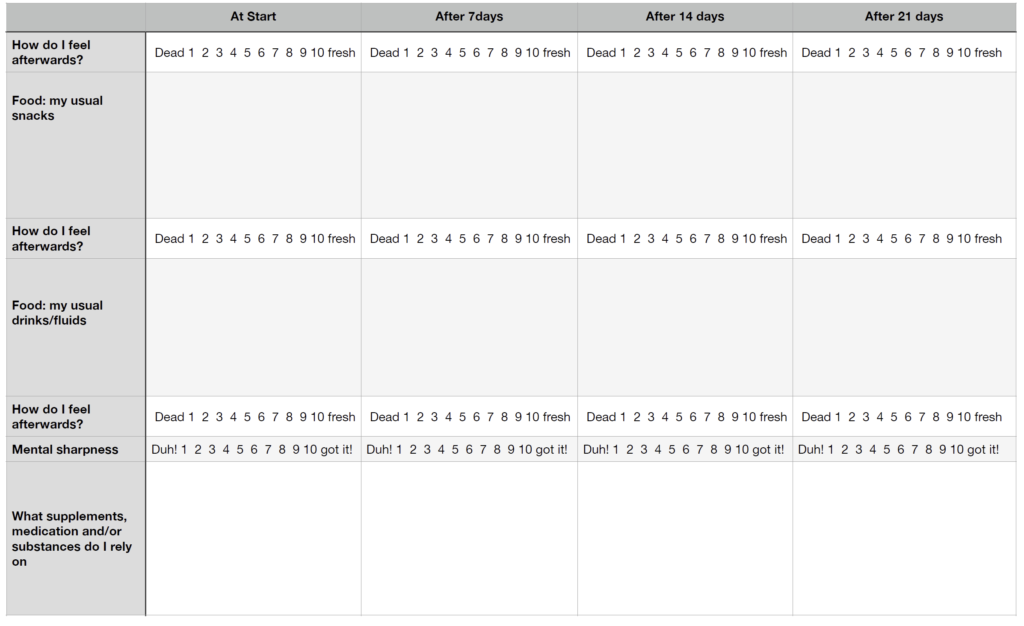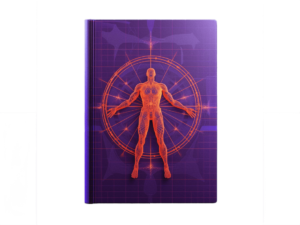Recovery
Framework
4 step, 28-day ritual/habit creation. Taking stock, bringing awareness to the self and behavioral patterns, creating change, and reevaluation.
To take into consideration:
Excess vegetable oil, high fructose corn syrup, histamine producing food, and intolerances to lectins, gluten, dairy, etc. Eliminating anything that maybe causing harm before introducing anything new.
Moldy home or workplace and inadequate or polluted airflow.
Lack of sun exposure or too much – without increasing tolerance progressively (in line with seasonal change).
Mouth breathing (subsequent apnea, asthma, ADHD, etc., symptoms)
High stress lifestyle with a type A approach to “relaxation”
Injuries, chronic pain, and trauma
Addictions and unresolved trauma
Stage 1: Taking Stock
What is your goal/pain point?
A simple snapshot of the current situation. Beginning the self-discovery journey and documenting the starting point.



Stage 2 & 3: Awareness & Change
While completing these tasks it will help to focus on one activity at a time. Although, it is possible to compound exercises if need be. Such as turning on the jug while exercising, making the bed immediately, or cooking breakfast as long as low attention is required.
Morning Ritual
15 x Deep breaths: To wake, clear head, and start the day in PNS mode
Bathroom
- Toilet
- Clean up (may be competed after other steps)
Stretch/Movement: For lymphatic flow, blood flow, and oxygenation. Pick 1-2. Keep low-intensity.
- Yoga
- Foam roll
- Mobility exercises
- 15min walk outside
Make bed: Represents the end of rest and earns an easy win
Breakfast: Earned after movement practice
- Intermittent fast (if desired)
- Morning tea or coffee
- Low glycemic carbohydrates and aiming to get 30g of protein
- Pay attention to how you feel 5 minutes to 2 hours afterwards
Evening Ritual
Turn off screens: 90 minutes before bed time. If not possible, turn on eye-comfort, blue-light blocking shield, etc. on devices.
Diary/daily summary: Finalize and evaluate the day.
- Diary/journal
Plan next day and prep: To prevent the energy demand of early morning decision making
- Clothes and equipment prep
Bathroom
15 x deep breaths: Longer exhalations to lower heart rate
- 4-7-8
- Contract and release exercise (progressive – from toes to face) upon exhalation
Sleep: Only sleep and sex in the bedroom. Save all activity, and especially electronic device use, for another room
Stage 4: Reevaluation
Difficulty
Easy
Manageable
Challenging
Subjective Measurements
Taking stock again
Average mood
Performance at work
Family experience
Next Step
If easy + none-to-major improvements to subjective measurements, progress to the next stage.
If manageable + none-to-major improvements, give the option of adding complexity to the current plan, e.g., introducing food diary (not calories), assess exercise intensity, or moving to the next stage. No added payment for repeating a system so there is no desperation to rush.
If challenging + none-to-major improvements, assess support system, lower exercise intensity, focus on a simpler ritual.
If a negative impact has occurred there may be socio-emotional issues at play, failure to comply, or over-commitment.
Next Level
Stage 1: Health Focused Goal Setting
What went well in the last run?
What did you learn about yourself?
Is your original goal still applicable and important to you?
If not, what is your new goal?
A habit scorecard (Requires more research):
- A Point-and-Call example for a morning ritual:
- Wake up =
- Turn off alarm =
- Check phone –
- Go to bathroom =
- Weigh +
- Take a shower +
- Brush teeth +
- Floss teeth +
- Deodorant +
- Hang towel =
- Get dressed =
- Make a cup of tea +
- Once you have a full list you can look at each behavior and ask yourself if which ones are good, bad, or neutral behaviors. The +, -, and = beside the previous behaviors represent this. These marks depend on your goals and situation. Good and bad are subjective, as all tasks are effective at serving some specific role. Good habits have net positive outcomes (exercise may be painful/exhausting but will have a beneficial response later) and bad habits will have a net negative effect (smoking for stress relief will harm you in the long run).
- Assess the behaviors by whether they serve the purpose of helping you to become the person you would like to be. If they conflict with your desired identity, you should mark them as negative. This exercise is just making a scorecard without judgement or blame. No need for action yet, just attention.
- Acknowledge your habits before you carry them out. If you are about to eat a cookie, verbally point and call the action and why you are planning on eating it. Acknowledge the cues that lead to these behaviors.
Stage 2 & 3: Awareness & Change
Introducing mindfulness.
Morning Ritual
15 x Deep breaths: Focus on the diaphragm movement and air passing through the nose. Pick 1.
- Belly breathing
- Box breathing
Bathroom time
- Toilet
- Clean up (may be competed after other steps)
Oil Pulling while completing the next few steps (Optional). Pick 1.
- Coconut oil
- Olive oil (make sure it is not rancid as some companies cut their olive oil with vegetable oil and it can oxidize when exposed to light)
Water bottle or glass of water
- Pinch of rock or sea salt
- Lemon juice or apple cider vinegar
Stretch/Movement: For lymphatic flow, blood flow, and oxygenation. If the weather allows, try to get outside for the morning exercise. Extra points for performing on grass and/or dirt. Pick 1-2. Keep low-intensity.
- Yoga
- Foam roll
- Developmental mobility
- 15min walk outside (ideally first thing in the morning, in nature)
- Skipping (jump rope)
- Bodyweight exercise
Make bed: Represents the end of rest and to earn an easy win
Breakfast: Earned after movement practice.
- Intermittent fast (if desired)
- Morning tea or coffee
- Low glycemic carbohydrates, protein, and fat combination
- Begin your daily food diary.
Daily Tasks
Food diary for 1 week. Include type of food, time, and how you feel afterwards.
5 x Deep breathing when stress levels elevate
Daily Tasks
Spend undistracted time with family/friends
Evening Ritual
Turn off screens: 120-90 minutes before bed time. If not possible, turn on eye-comfort, blue-light blocking shield, etc. on devices.
Prepare a bed time drink (Optional). Pick 1.
- Caffeine free tea (chamomile, peppermint, etc.)
- Warm milk (if lactose tolerant and ideally A2 or raw)
Diary/daily summary: Finalize and evaluate the day.
- Diary/journal
Plan next day and prep: To prevent morning decision making energy demand
- To do list/plans. What is the most important task? Schedule first.
- Clothes and equipment prep
Bathroom
- Toilet
- Clean up
15 x deep breaths: Longer exhalations to lower heart rate
- 4-7-8 breath rate.
Sleep
Stage 4: Reevaluation
Difficulty
Easy
Manageable
Challenging
Subjective Measurements
Taking stock again
Average mood
Performance at work
Family experience. Are these exercises things you can all do together (walks, meals, exercise, interaction instead of screen time)?
Next Step
If easy + none-to-major improvements to subjective measurements, progress to the next stage.
If manageable + none-to-major improvements, give the option of adding complexity to the current plan, e.g., introducing food diary (not calorie counting), assess exercise intensity, or moving to the next stage. No added payment for repeating a system so there is no desperation to rush.
If challenging + none-to-major improvements, assess support system, lower exercise intensity, focus on a simpler ritual.
If a negative impact has occurred there may be socio-emotional issues at play, failure to comply, or over-commitment.
Next Level
Stage 1: Lifestyle Goal Setting
What went well in the last run?
What did you learn about yourself?
Is your original goal still applicable and important to you?
If not, what is your new goal?
What is a lifestyle challenge you would like to set for yourself (exercise, mindfulness, work, family)?
Stage 2 & 3: Awareness & Change
Increasing intensity and greater physiological autonomy.
Morning Ritual
15 x Deep breaths: Focus on the diaphragm movement and air passing through the nose
- Belly breathing
- Box breathing
- WHM for energy & autoimmunity regulation.
Bathroom time
- Toilet
- Clean up (may be competed after other steps)
Oil Pulling while completing the next few steps (Optional)
- Coconut oil
- Olive oil (make sure it is not rancid)
Water bottle or glass of water
- Pinch of rock or sea salt
- Lemon juice or apple cider vinegar
Stretch/Movement: For lymphatic flow, blood flow, and oxygenation. If the weather allows, try to get outside for the morning exercise. Extra points for performing on grass and/or dirt (even more for being barefoot). Increase the intensity of the exercise. Try to be barefoot as often as possible so you can restrengthen your feet after deforming them and losing their proprioception inside shoes.
- Yoga
- Foam roll
- Developmental mobility
- 15min walk outside
- Skipping (jump rope)
- Bodyweight exercise
- 8–10-minute HIIT after warmup
Make bed: Represents the end of rest and to earn an easy win
Breakfast: Earned after movement practice.
- Intermittent fast (if desired)
- Morning tea or coffee
- Low glycemic carbohydrates, protein, and fat combination
- Supplement regime (dependent on health status)
Daily Tasks
Lunchtime breathwork of your choice
Pick up a creative endeavor or personal project and dedicate 15 minutes to it
Evening Ritual
Turn off screens: 90 minutes before bed time. If not possible, turn on eye-comfort, blue-light blocking shield, etc. on devices.
Prepare a bed time drink
- Caffeine free tea (chamomile, peppermint, etc.)
- Warm milk (if lactose tolerant and ideally A2 or raw)
Supplement regime
Stretch/yoga (optional)
Diary/daily summary: Finalize and evaluate the day
- Diary
- Gratitude journal
Plan next day and prep: To prevent morning decision making energy demand
- To do list/plans. What is the most important task? Schedule first.
- Clothes and equipment prep
Bathroom
- Toilet
- Clean up
15 x deep breaths: Longer exhalations to lower heart rate
- 4-7-8
Sleep
Next Level
Congratulations on completing the recovery program! Do a final stock take of your health, any unexpected results you found, and how you feel compared to when you began. Now might be a good time to reassess your goals. There is no need to try anything more than what has been suggested. The habit scorecard and assessment, wake and sleep schedule, and food and exercise plans will tend to alleviate the symptoms of the majority of our modernized health issues. For a planner targeted towards a more specific health ailment, it may help to get personalized advice from one of our coaches, communicate with your doctor, or integrate some of the techniques described in the Simplifying Dysfunction section of the Human Operating Manual.
***Spare Activity List***
Breathing
Diaphragmatic Breathing
- Pranayama attentional breathing (hand on belly)
Stress Management
- Box Breathing
Nasal Breathing
- Mouth Taping
Circadian Rhythm
Sun exposure
- Morning
- Avoiding blue light at night
Sleep schedule
- Chronobiology
Exercise
- Morning aerobic or low intensity bodyweight
- Yoga or mobility to wind down
Nutrition
Basic rules
- Avoid excess sugar, packages, and vegetable oils
- Color variance
- Eat only when hungry
- Portion control
Food diary
- App
- Physical diary
Testing for sensitivities
- Elimination diet
- Genetic testing, e.g. 23andMe
- Track in diary
Diets
- Autoimmune protocol
- FODMAP
- Intermittent Fasting
Weight control
- Caloric deficit
- Protein maintenance
- Mindful eating – no tv during meals
Movement
Breath work
Developmental mobility (OHM)
Bodyweight
- Low intensity morning workout
Sports
- Group sports for optimal health gain if you discount bad decision making skills during group think situations
- Martial arts for breath, balance, coordination, discipline. Possibility of injury and competitive edge driving mental health down
Heat/Cold
Cold
- Cold showers
Ocean, river, and lake
Heat
- Sauna
- Bath (Mg salts added)
Mindfulness
Breath work
Exercise
Meditation
- Transcendental
- Headspace
Emotional Regulation
- Gratitude journal
Social Interaction
Exercise/sports
Music
- Concerts and gigs
- Playing instruments
- Sound healing
Creative endeavors
Communication
Environment
Removing dangerous substances
- Mold
- Cleaning products
- Bodycare products (parabens and phthalates)
- Drugs and alcohol
Removing negatively influential factors
- Social
- Physical
- Music
- Environmental cues
